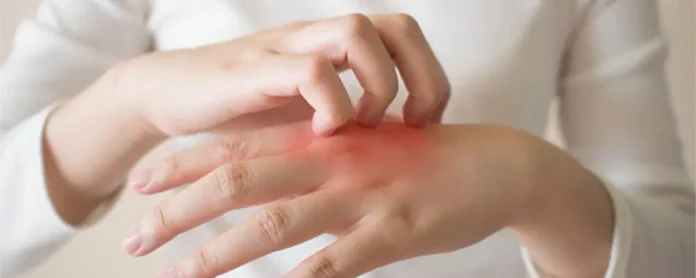More than a mild little inconvenience, chronic itchy skin, or pruritus, is an ailment suffered by hundreds of thousands of Americans. Itching can be so persistent that it keeps people up at night, interferes with concentration and adversely affects quality of life. Chronic itching is difficult to diagnose since it may be a symptom of other problems, unlike some occasional itching that should improve after a while. Its causes should be understood and its remedies should be explored in order to get relief and have healthy skin.
What is Chronic Itchy Skin?
Taking the condition with a name called chronic itchy skin is chronic and most of the time thick itchy skin that lasts for weeks or even months. The redness, dryness, or lesion is often present. Chronic pruritus, however, is not due to a short–term itch from an insect bite or superficial irritation; a deeper investigation is needed to find out what is causing the problem in the first instance.
Common Cause of Chronic Itchy Skin
There are many reasons why chronic itchy skin can happen. Here are the most common ones:
Skin Conditions:
- Atopic dermatitis, known as eczema, is characterized by intense itching; and if you have dry skin or sensitive skin, the itching is all the more apparent.
- Chronic itching is also associated with psoriasis, which causes scaly patches.
- Contact dermatitis is a reaction of your skin to irritants like chemicals or fabric.
Allergic Reactions:
Itching may be caused by allergies to some foods, medications, or skincare products The reactions may be accompanied by hives or swelling.
Environmental Triggers:
During winter and beyond, dry air strips away your skin’s natural moisture, making it itchy. Smog and other pollutants and irritants in the air can make the symptoms worse.
Underlying Health Conditions:
- Itching can result from liver or kidney disorders, buildup of toxins in the blood.
- Diabetic neuropathy is a nerve problem that may occur in people with diabetes, and presents as itching.
- Dry and itchy skin can come about as thyroid imbalances.
Neurological Issues:
Having some conditions, like multiple sclerosis or shingles, can damage the nerves to the point that you itch without visible skin irritation.
Psychological Factors:
Itching is often made worse by stress and anxiety. Those under stress, for instance, will often scratch too much and make the problem worse.
Other Causes:
Chronic itchy skin can be caused by insect bites, medications and even aging.
Diagnosis of Itchy Skin
This means that accurate diagnosis is important for right treatment. The typical first steps involve a review of medical history by a skin specialist in Karachi or healthcare providers and a physical skin examination. Other tests, like blood work or allergy tests, may be used to determine if underlying conditions need to be found. The root cause is identified so that treatment will specifically target the problem.
Chronic Itchy Skin Remedies
There are several ways to address chronic itchy skin, ranging from medical treatments to home remedies:
Medical Treatments:
- The inflammation and itching it causes may be controlled with topical corticosteroids or antihistamines.
- Autoimmune related skin conditions like eczema, psoriasis are treated with immunosuppressants.
- The skin barrier can be repaired and hydration locked in, by prescription moisturizers that contain ceramides or urea.
Natural Remedies:
- Bathe in cool oatmeal baths to soothe inflamed skin and help to relieve temporarily.
- Aloe vera gel has a cooling property that helps get rid of itchiness and irritation.
- Coconut oil makes a wonderful moisturizer for dry and sensitive skin.
Lifestyle Adjustments:
- Avoid harsh detergents, allergens or extreme weather conditions.
- Keep skin hydrated by using fragrance free, hypoallergenic moisturizers always.
- In order to minimize irritation wear loose fitting, breathable clothing.
Home Care Tips:
- Cold compresses will calm itchy skin.
- Avoid scratching, as it will give infections and can make matters worse.
- In dry weather, use a humidifier to put moisture back in the air.
Preventing Chronic Itchy Skin
Prevention is better than cure, and maintaining healthy skin can significantly reduce the risk of chronic itching. Consulting the best dermatologist in Islamabad can also provide personalized advice for prevention. Here are some tips:
- Create a routine of moisturizing regularly, especially after bathing to stay hydrated.
- Use fragrance free, gentle skincare and avoid too much washing as this can be irritating.
- Relaxation techniques such as yoga or meditation can help you manage stress.
- Make sure you stay hydrated and maintain a diet full of skin friendly nutrients such as omega 3 fatty acids and antioxidants.
Conclusion
Itchy skin that lasts for a long time is physically and emotionally exhausting, but treating this type of itch starts with finding a cause. And there are many ways to manage and cure (or, at the very least, relieve symptoms) from medical solutions to natural remedies. However, if itching exists, it’s critical to call a professional to make sure a lurking condition is corrected. Through appropriate skincare, dietary adjustments, and stress management, people may breathe a little easier and have a better quality of life.

